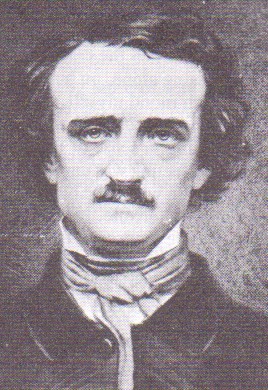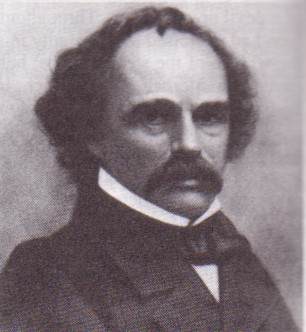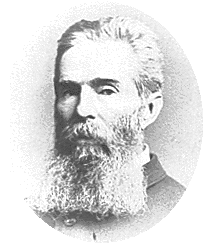|
● Early
Fiction
● Transcendentalists
● Power
of Imagination
● New
Visions of America
● Reform
and Liberation
● Regionalism
● A
New Wave
● Sympathetic
Views
● Rebellious Spirit
● The
Modernists
● The Lost Generation
● Harlem Renaissance
● New
Drama
● Depression,
Realism and Escapism
● Postwar Voices
and the "Beat Generation"
● New American
Voices
Power of Imagination
 |
|
Edgar Allan Poe
|
 While
these New England intellectuals presented perspectives
of literature and life, other writers were concentrating upon human
imagination and emotion rather than the intellect.
A young Virginian, Edgar Allan Poe (1809-1849), was publishing
poems of musical language and extravagant
imagery, which
made him a worthy rival of the European Romantic poets.
Brilliant but unstable, Poe earned his living as a journalist, often
writing devastating
reviews of other writers' works. In 1835, he also began writing
bold, original
short stories, such as "The Masque of Red Death" and "The
Fall of the House of Usher." These
suspenseful, sometimes terrifying tales plunged deep into human
psychology, and explored the realms of science fiction and the mystery
story long before such genres were recognized. While
these New England intellectuals presented perspectives
of literature and life, other writers were concentrating upon human
imagination and emotion rather than the intellect.
A young Virginian, Edgar Allan Poe (1809-1849), was publishing
poems of musical language and extravagant
imagery, which
made him a worthy rival of the European Romantic poets.
Brilliant but unstable, Poe earned his living as a journalist, often
writing devastating
reviews of other writers' works. In 1835, he also began writing
bold, original
short stories, such as "The Masque of Red Death" and "The
Fall of the House of Usher." These
suspenseful, sometimes terrifying tales plunged deep into human
psychology, and explored the realms of science fiction and the mystery
story long before such genres were recognized.
 |
|
Hawthorne
|
 Meanwhile,
in 1837, a young writer in New England named Nathaniel
Hawthorne (1804-1864) published a volume called Twice-Told
Tales, stories rich in symbolism
and peculiar incidents. Although he knew the Transcendentalists,
Hawthorne did not share their beliefs. His way of rebelling against
the traditional New England outlook on life was to write imaginative
"romances," stories and novels which were not necessarily
realistic but which were designed to explore certain moral themes
such as guilt,
pride and emotional repression.
His masterpiece
was The Scarlet Letter, a novel published in 1850. Set
in the Puritan past, it is the stark drama of a woman harshly cast
out from her community for committing the sin of adultery. Meanwhile,
in 1837, a young writer in New England named Nathaniel
Hawthorne (1804-1864) published a volume called Twice-Told
Tales, stories rich in symbolism
and peculiar incidents. Although he knew the Transcendentalists,
Hawthorne did not share their beliefs. His way of rebelling against
the traditional New England outlook on life was to write imaginative
"romances," stories and novels which were not necessarily
realistic but which were designed to explore certain moral themes
such as guilt,
pride and emotional repression.
His masterpiece
was The Scarlet Letter, a novel published in 1850. Set
in the Puritan past, it is the stark drama of a woman harshly cast
out from her community for committing the sin of adultery.
 |
|
Herman Melviile
|
 Hawthorne's
writing had a profound impact upon another writer, originally from
New York, who was living at the time in New England. Herman
Melville (1819-1891), whose wealthy father had gone bankrupt,
had worked at many jobs before
signing on in 1839 for the first of several sea voyages.
Seven years later, he began writing accounts of his adventures on
the open seas and in exotic
ports, which won him instant success. Yet Melville longed to write
something more serious. Inspired by Hawthorne's example, he began
writing novels which were fundamentally allegories
on politics and religion. The public rejected them, however, and,
discouraged, Melville published little except poetry for the rest
of his life. Ironically,
the very books that proved unacceptable during his lifetime are
the ones most admired today. Moby Dick, published
in 1851, uses a story of a
whaling voyage to explore profound themes such as fate,
the nature of evil, and the individual's struggle against the universe.
It is considered an American masterpiece. Hawthorne's
writing had a profound impact upon another writer, originally from
New York, who was living at the time in New England. Herman
Melville (1819-1891), whose wealthy father had gone bankrupt,
had worked at many jobs before
signing on in 1839 for the first of several sea voyages.
Seven years later, he began writing accounts of his adventures on
the open seas and in exotic
ports, which won him instant success. Yet Melville longed to write
something more serious. Inspired by Hawthorne's example, he began
writing novels which were fundamentally allegories
on politics and religion. The public rejected them, however, and,
discouraged, Melville published little except poetry for the rest
of his life. Ironically,
the very books that proved unacceptable during his lifetime are
the ones most admired today. Moby Dick, published
in 1851, uses a story of a
whaling voyage to explore profound themes such as fate,
the nature of evil, and the individual's struggle against the universe.
It is considered an American masterpiece.
Previous Page Next
Page
|

